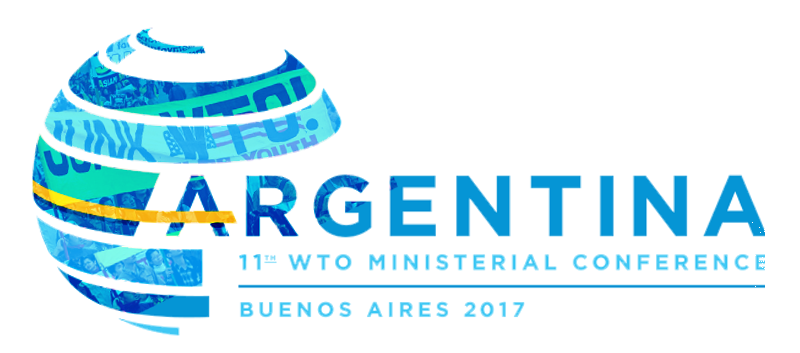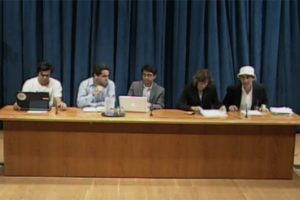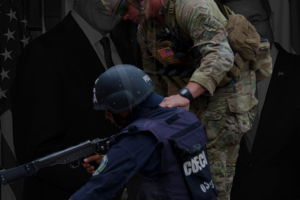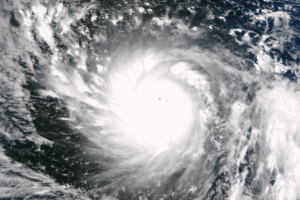[[{“type”:”media”,”view_mode”:”media_original”,”fid”:”1943″,”attributes”:{“alt”:””,”class”:”media-image”,”height”:”353″,”style”:”width: 600px; height: 265px;”,”typeof”:”foaf:Image”,”width”:”800″}}]]
Photo credit: WTO and ILPS
IBON International Statement
10 December 2017
Today, December 10, the World Trade Organisation (WTO) will have its opening session for its 11th Ministerial Conference (MC11). December 10 is also commemorated as the International Human Rights Day.
For IBON International, a Southern-based organisation working on peoples’ political and economic rights, this is nothing short of an irony. For decades peoples’ rights, livelihoods and development have been great casualties of the economic attacks waged by transnational corporations (TNCs) and elite-led states through the WTO.
The liberalisation promoted by the WTO has driven the rise of appalling export processing zones in the global South, often with no right to unions and strikes, no job security and low wages. The WTO’s neoliberal framework left farmers and small-scale fisherfolk among the poorest of the poor, with countries in Asia and Africa becoming net importers of agricultural goods. Extractive TNCs entered resource-rich Southern countries through investment liberalisation and plundered indigenous peoples’ ancestral domains and destroyed sustainable practices.
And now peoples are again under threat through MC11 talks on agriculture, fisheries subsidies, domestic regulation and e-commerce rules. MC11 could deprive small-scale fisherfolk in developing countries of what are now small-to-absent subsidies for their development. Meanwhile, the basics of the “e-commerce” agenda to be peddled in MC11 allow only gains for tech TNCs that would extend their grip further into the smallest of businesses.
While WTO Director General Azevedo is of the opinion that there will be no “agreed negotiated outcomes” for MC11, IBON International calls on peoples to be vigilant. The smallest success for the WTO’s liberalisation agenda means the biggest of burden for people’s livelihoods and rights in the years to come.
IBON International asserts that “development agenda” within the WTO will never be enough as long as its basic premises are founded on worsening corporate plunder against workers, farmers, small-scale fisherfolk and indigenous peoples. What is needed today, more than ever, are frameworks founded on addressing people’s demands for land, livelihood, full employment and just wages, indigenous peoples’ self-determination — and for an overhaul of the current economic system.
This would be impossible when big business interests are on full volume. IBON International condemns the WTO-Argentine government ban on CSOs. Such Argentine government restriction on CSOs fits well with corporate agenda in the WTO. Worse, an MC11 “Business Forum” is set to take place but no venues for many important “stakeholders”: the poor and marginalised in the global South. This is an affront to people’s voices, which for decades, have been trampled upon. When WTO outcomes translate to country “reforms” for TNCs, these are commonly imposed on peoples who have no genuine voice in the elite-led processes that affect local livelihoods and rights.
Peoples will have to continue building up resistance to the WTO as one of the biggest promoters of the neoliberal and imperialist attacks on people’s political and economic rights. IBON International stands with advocates and peoples from both the global North and South in resisting the WTO. We enjoin civil society organisations and movements to defend peoples’ rights in trade and development by ending the main problem: the WTO as a supreme neoliberal institution itself.
Join the December 10 Global Day of Action against the WTO on the talks’ opening day, spearheaded by the global civil society campaign network, People Over Profit.
Resist Neoliberal Trade! Fight Imperialist Globalisation! Fuera OMC! Junk WTO!
IBON International (www.iboninternational.org) engages in capacity development for people’s rights and democracy around the world. It strengthens links between local campaigns and advocacies to international initiatives and brings development issues from the international arena in a way that peoples’ organizations and social movements can engage with at country level.




